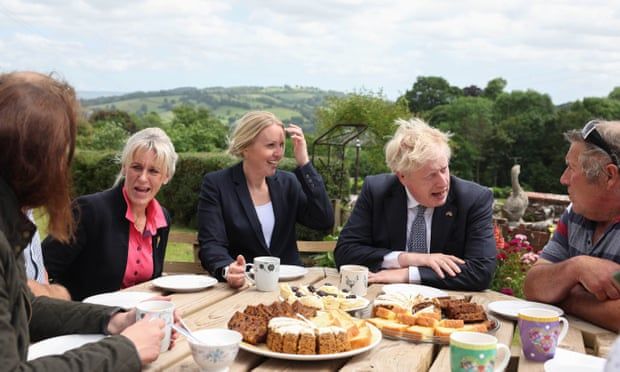Anger grows before West Country by-election as farmers say they will be left poorer and unable to compete with foreign producers
Boris Johnson’s hopes of surviving as prime minister have been dealt a serious blow after farmers and environmentalists condemned his government’s post-Brexit food strategy as a disaster for people in the countryside – with less than two weeks to go before a key rural byelection.
In an interview with the Observer, the president of the National Farmers Union, Minette Batters, said ambitious proposals to help farmers increase food production, first put forward last year by the government’s food tsar, Henry Dimbleby, had been “stripped to the bone” in a new policy document, and meant farmers would not be able to produce affordable food.
Batters said she had told the PM on Friday that farmers – including those in the West Country seat of Tiverton and Honiton, where a crucial byelection will be held on 23 June – were furious with post-Brexit policies that they believed would make them poorer and leave them unable to compete with foreign producers.
The byelection, caused by the resignation of Tory MP Neil Parish for watching pornography on his phone in the Commons, is seen as critical to Boris Johnson’s chances of remaining in Downing Street, after he suffered a bruising revolt by 148 Tory MPs in a confidence vote last week.
The Liberal Democrats are trying to overturn a Tory majority of 24,239 in the seat in what would be one of the biggest byelection shocks of recent times. If the Conservatives were to lose the election to the Lib Dems, and Labour to retake Wakefield from them on the same day, many Tory MPs believe Johnson will be unable to survive as prime minister.
Last night farmers in the West Country seat said the agricultural community would be voting en masse against the Tories. This was because they were facing a combination of loss of income from subsidies and pressure to prioritise the environment over food production, when the country needed to become more self-sufficient in food.
A rural revolt on a large scale in the byelection would compound the prime minister’s problems over Partygate and the cost of living crisis, which are already hitting Tory support.
Commenting on the new government food strategy, leaked to the Guardian on Friday, Batters said she was “pleased to see a commitment on food security” but added that the original strategy had been “stripped to the bare bones” and that there was no plan left on how to implement its overall aims.
“We want to be eating more British and more local food but again I just ask how,” she said, adding: “It’s all very well to have words but it’s got to have really meaningful delivery and we aren’t seeing that yet in this document.”
Batters said she met Johnson on Friday and told him that farmers wanted to be supported to produce food, as well as help the environment. “I said that is what farmers in Tiverton want to see. Farmers want the detail.” She said that at present there was no clear policy.
 Boris Johnson meets voters at the Royal Cornwall Show.
Boris Johnson meets voters at the Royal Cornwall Show.
The Department for Environment, Food and Rural Affairs (Defra) said it would not comment on the strategy document until it is released on Monday.
Farmers have become increasingly disenchanted, having been promised that their previous EU subsidies would replaced in full after Brexit. Instead they are being gradually phased out, with basic payments being cut by 20% this year. In addition they say the scheme intended to pay them for adopting green policies such as planting new trees and hedges and building new ponds (known as rewilding) remains vague and confusing.
Jake Fiennes, a sustainable farmer and author of Land Healer: How Farming Can Save Britain’s Countryside, said: “It’s a rather weak 27-page document that says nothing. I see the farming sector disappointed, I see the environmental ambition down, I see a very shortsighted view. Food security and environmental resilience are the challenges of this generation and it is so depressing.”
John Wescott, a beef and sheep farmer from Bampton, near Tiverton, told the Observer that “most farmers would be voting against the Conservatives not because they wanted to for the long term, but because their policies were not doing anything to help them and were harming their businesses”.
Tim Farron, the former Lib Dem leader and now the party’s rural affairs spokesman, described the new strategy as “timid” and representing “no real change”.
Henry Dimbleby was commissioned by the government to produce a review which would tackle the obesity crisis as well as the affordability of healthy food. He was also asked to show how this could be done in an environmentally friendly way.
But his ambitious recommendations, including expanding free school meals, a 30% reduction in meat and dairy consumption and giving strong protection to British farmers by not undermining them in trade deals with other countries, have not been adopted.
His method was hailed by organic farmers as a blueprint to make Britain self-sufficient in food without compromising on the environment, and helping farmers to transition from intensive farming.















